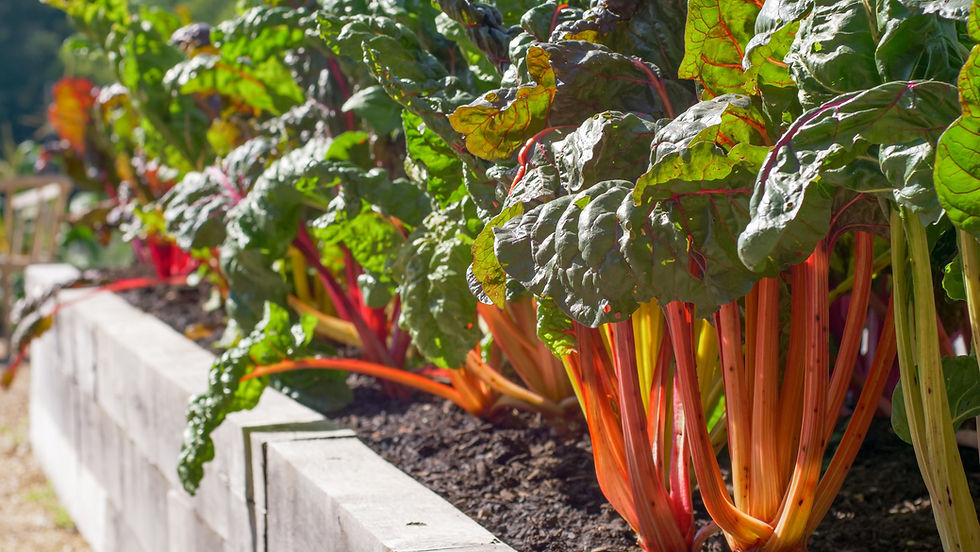The Power of Rhubarb: A Natural Remedy for Constipation Relief
- Robert Collazo

- Oct 30, 2024
- 4 min read
Updated: Oct 30, 2024

Wait, what? Rhubarb can help with constipation. Read on to learn more…
Constipation can be a frustrating and uncomfortable experience, but did you know that a delicious natural remedy may be hiding in your kitchen? Rhubarb, a vibrant and tangy vegetable, is a great addition to your culinary creations but also offers significant benefits for digestive health. Let’s explore how rhubarb can help alleviate constipation and how to incorporate it into your diet.
How Rhubarb is Used in Traditional Chinese Medicine (TCM)
In Traditional Chinese Medicine (TCM), Rhubarb (Da Huang, 大黄) is a widely used herb with several important properties and applications. Often combined with other herbal ingredients depending on the desired therapeutic effect. Here are some key aspects of rhubarb in TCM:
Properties
Taste: Bitter and sour
Nature: Cold
Organs Entered: Primarily the Liver, Heart, and Large Intestine
Functions
Purgative: Rhubarb is well-known for its strong laxative effect, helping to relieve constipation by promoting bowel movements. Particularly effective when there is excess heat or dryness in the intestines.
Clearing Excess Heat and Toxins: Making it beneficial for conditions like fever, irritability, and skin issues (such as boils or eczema).
Blood Cooling: Rhubarb is thought to cool the blood and can help with conditions related to blood heat, such as heavy menstrual bleeding or certain inflammatory conditions.
Anti-inflammatory: It may help reduce inflammation and is sometimes included in formulas for inflammatory (heat) conditions.
Indications
Constipation, especially when associated with heat and dryness
Gastrointestinal disorders
Skin conditions related to heat or toxicity
Blood stagnation-related issues
Cautions
Pregnancy: Generally contraindicated due to its strong purgative effects.
Diarrhea: Should be avoided in cases of diarrhea or loose stools.
Cold Conditions: Not suitable for those with a deficiency of Yang or cold symptoms.
Usage
Rhubarb can be used in various forms, including dried slices, powders, and as part of herbal formulas. It is often combined with other herbs to enhance its effects and reduce potential side effects.
TCM Section Conclusion
Rhubarb is a powerful herb in TCM, particularly for treating digestive issues and clearing heat. As always, it is best to consult a qualified TCM practitioner for appropriate usage tailored to individual health needs.
More Benefits of Eating Rhubarb for Constipation
1. High Fiber Content
Rhubarb is packed with dietary fiber, which plays a crucial role in promoting regular bowel movements. Fiber adds bulk to your stool and helps retain water in the intestines, softening the stool and making it easier to pass. Incorporating high-fiber foods into your diet, like rhubarb, can help maintain digestive health and prevent constipation.
2. Natural Laxative Effect
Rhubarb contains anthraquinones, compounds that provide a mild laxative effect. These natural compounds stimulate the intestinal muscles, promoting peristalsis, the wave-like contractions that move food through your digestive tract. This can lead to more effective bowel movements and relief from constipation.
3. Hydration
With its high water content, rhubarb can help keep your digestive system hydrated. Staying hydrated is essential for overall digestive health and can assist in maintaining regular bowel movements. Including hydrating foods like rhubarb in your diet is a tasty way to support your body.
How to Consume Rhubarb
Raw: Young rhubarb stalks can be enjoyed raw, although they may be quite tart. Try adding them to salads or smoothies for a refreshing crunch.
Cooked: Rhubarb can be stewed, baked, or incorporated into many dishes such as jams, pies, and compotes. Cooking reduces the tartness and enhances the sweetness, making it a delightful addition to many recipes.
Tea: Brew rhubarb as a tea for a warm and soothing drink that may provide gentle relief from constipation.
Chinese Herbal Medicine: Rhubarb is combined with other herbs in certain herbal formulas for its effectiveness in treating everything mention at the beginning of this blog. Please consult with a licensed TCM practitioner before taking any Chinese Herbal Medicine Formulas.
Precautions
While rhubarb can be a beneficial addition to your diet, there are some important considerations to keep in mind:
Oxalic Acid: Rhubarb leaves contain oxalic acid, which is toxic and should never be consumed. Only the stalks are safe to eat.
Moderation: Although rhubarb can help relieve constipation, excessive consumption may lead to diarrhea or cramping. Start with small amounts to see how your body reacts.
Underlying Conditions: If you are experiencing chronic or severe constipation, please consult a healthcare professional to rule out any underlying health issues.
Conclusion
Incorporating rhubarb into your diet can be a delicious way to help alleviate constipation. Its high fiber content, natural laxative properties, and hydrating effects make it an excellent choice for promoting digestive health. However, remember to enjoy it in moderation. Maintain a balanced diet of vegetables and small portions of whole fruits for optimal digestive wellness.
Restorative Care Acupuncture & Health has an amazing success rate when treating many health problems, especially digestion issues using acupuncture, Chinese herbal medicine, and dietary modification consults. If you or someone you know needs the amazing benefits of Chinese medicine, make them “aware” there is help. Contact us today to book an appointment and we will let you know what we can do for you. We strive to provide the best Chinese medicine and acupuncture in Miami.
.png)






Comments